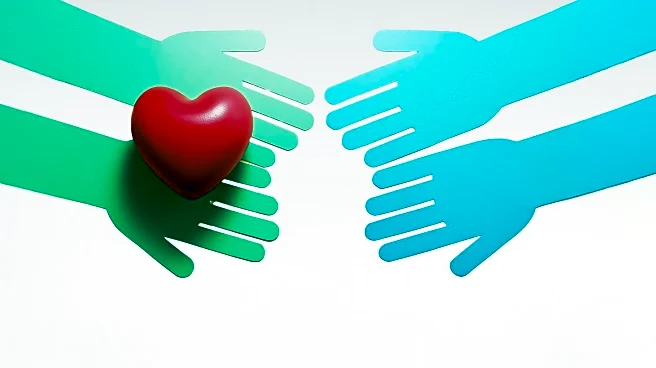What is the story about?
What's Happening?
Organ Donation Week, observed from September 22-28, brings attention to the life-saving impact of organ transplants through the stories of individuals like Glen Taylor and the family of Josh Atkins. Glen Taylor, a former professional jockey from South Yorkshire, received life-saving organ transplants after being diagnosed with kidney failure. Over the years, he has received organs from three different donors, allowing him to return to a full life and even compete in the World Transplant Games. Meanwhile, the family of Josh Atkins, a 17-year-old who died in a car crash, chose to donate his organs, saving four lives. The Atkins family has maintained contact with the recipients, finding solace in the lives saved by Josh's donations.
Why It's Important?
The stories of Glen Taylor and Josh Atkins underscore the profound impact of organ donation on both recipients and donor families. For recipients, organ transplants can mean the difference between life and death, offering a second chance at life and the ability to pursue passions and careers. For donor families, the decision to donate organs can provide a sense of purpose and comfort, knowing their loved one's legacy lives on through others. Organ Donation Week serves as a crucial reminder of the ongoing need for organ donors and the life-changing effects of their generosity. It highlights the importance of conversations about organ donation, encouraging more people to consider becoming donors.
What's Next?
As Organ Donation Week continues, efforts to raise awareness and encourage organ donation are expected to intensify. Healthcare organizations and advocacy groups may increase outreach and educational campaigns to inform the public about the benefits and process of organ donation. Families like the Taylors and Atkins may continue to share their stories to inspire others to consider organ donation. Additionally, policymakers might explore ways to streamline the organ donation process and address any barriers that potential donors face. The ongoing dialogue could lead to increased donor registrations, ultimately saving more lives.
Beyond the Headlines
The ethical and emotional dimensions of organ donation are significant. For donor families, the decision to donate can be a complex mix of grief and altruism, as they navigate the loss of a loved one while contributing to the survival of others. For recipients, the gratitude and responsibility of carrying another person's organ can be profound, often leading to a renewed sense of purpose and connection to the donor's family. These stories also highlight the cultural and societal shifts towards greater acceptance and understanding of organ donation, potentially influencing future generations to view it as a norm rather than an exception.















